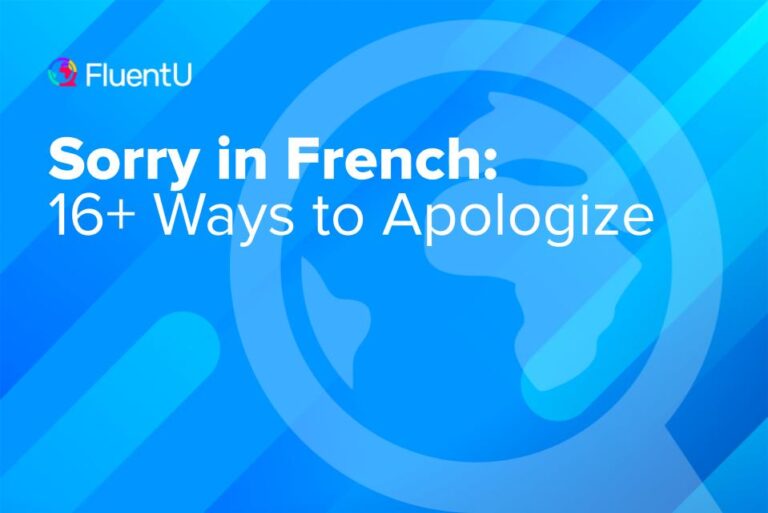Contents
- How to Ask “How Are You” in French
- 1. Comment allez-vous ? — How are you?
- 2. Comment ça va ? — How’s it going?
- 3. Comment vas-tu ? — How are you?
- 4. Ça va ? — How’s it going?
- 5. Tu vas bien ? / Vous allez bien ? — You’re doing well?
- 6. Quoi de neuf ? — What’s new?
- 7. Qu’est-ce qu’il y a ? — What’s wrong?
- 8. Que fais-tu ? — What’s up?
- 9. Ça roule ? — How’s it going?
- 10. Comment tu te sens ? — How are you feeling?
- Responses to “How Are You?” in French
- 11. Bien, merci ! — Good, thanks!
- 12. Ça va bien, et toi ? — It’s going well, how about you?
- 13. Oui, je vais bien, et toi/vous ? — Yeah, I’m fine, and you?
- 14. Comme ci, comme ça — Okay
- 15. Pas grand-chose — Not much
- 16. Ça va mal — It’s not going well
- 17. Non, je ne vais pas bien — I’m not doing well
- 18. T’inquiète (pas), je vais bien — Don’t worry, I’m fine
- And One More Thing...
18 Easy Ways to Ask “How Are You” in French

Knowing how to ask “How are you?” is fundamental for meeting people or making friends in French.
Read on to learn different ways to ask “How are you?” in French, with a brief explanation of each phrase.
And don’t forget to click on the phrase to hear it pronounced!
Download: This blog post is available as a convenient and portable PDF that you can take anywhere. Click here to get a copy. (Download)
How to Ask “How Are You” in French
1. Comment allez-vous ? — How are you?
Formality: Formal
Comment allez-vous ? is the most basic way of asking “how are you” in French. Note that vous, the formal “you,” is what makes the phrase formal.
You would use this version with people seen as superior to you such as a boss, a teacher or an elder.
You also use vous for a plural “you,” so if you’re asking two or more people how they are, you use this version as well.
Notice that with the verb aller (to go), you’re not so much asking “How are you?” but rather “How are you going?”
Also note that we use a hyphen and switch the subject and the verb in order to form a question.
2. Comment ça va ? — How’s it going?
Formality: Informal
Comment ça va ? is an informal version of Comment allez-vous ? so you should expect a similar response.
It’s worth noting that while the intent of the question is the same, the general or open phrasing of this question might encourage a longer answer, although this will often depend on your relationship with the person you are talking to.
Use this less formal version with friends, family and those of similar social status to you.
3. Comment vas-tu ? — How are you?
Formality: Informal
Comment vas-tu ? is a more informal way of saying Comment allez-vous ? Note that, again, the verb aller is used, giving this phrase a more direct meaning of “How are you going?”
The main difference between these two phrases is that in Comment vas-tu ? vous has been replaced by tu, which is the informal singular pronoun for “you” in French.
Comment vas-tu ? is often used in French with friends, family and people you are on familiar terms with.
4. Ça va ? — How’s it going?
Formality: Informal
Ça va (“How’s it going?” or “Are you okay?”) is an even more informal way of asking Comment ça va ? Alternatively, it can express concern as in asking if someone is okay.
This question is simple to use and also to respond to: Ça va bien/ça va mal (It’s going well/It’s not going well).
It’s generally used with people you know very well, although it’s not uncommon to hear it used between strangers or acquaintances.
5. Tu vas bien ? / Vous allez bien ? — You’re doing well?
Formality: Informal
Tu vas bien/vous allez bien ? (You’re doing well) can be used to ask “How are you?” or to express preoccupation, depending on the tone and context.
In these phrases, tu is used as the informal singular “you” and vous can be used either as a formal singular “you” or the plural “you” form.
When speaking French, we can ask questions by just raising the tone of our voice, so we don’t have to use Est-ce que or a hyphen.
6. Quoi de neuf ? — What’s new?
Formality: Informal
Quoi de neuf ? isn’t exactly asking “How are you?” but it’s still a question you can ask when you start a conversation.
It can also be translated as “What’s up?” and is an informal question you ask someone you haven’t seen in a while.
Quoi de neuf ? is more colloquial than the other phrases previously listed and is used in informal contexts, such as with close friends or family members. It’s one of those phrases that when used correctly, you come off sounding a lot more natural and native as a French speaker. You can learn more in the FluentU French YouTube video below:
7. Qu’est-ce qu’il y a ? — What’s wrong?
Formality: Formal and Informal
Qu’est-ce qu’il y a ? is used to express concern and can be both formal and informal.
Although it doesn’t exactly mean “How are you?” it’s a common way to start a conversation with someone you know.
This question will often encourage a longer response from the person you are talking to as it’s open and initiates further conversation.
8. Que fais-tu ? — What’s up?
Formality: Informal
Que fais-tu ? literally means “What are you doing?” in English, but it’s a great conversation starter because it can also be interpreted as “What’s up?”
As well as the general meaning of this phrase being more colloquial, leading to it being used in informal contexts, this question is also informal because of the use of tu.
Despite being used in similar contexts to the other phrases used to say “How are you?” in French, it’s likely that the responses you’ll receive with this question will vary.
9. Ça roule ? — How’s it going?
Formality: Informal
Another informal way to ask someone “How are you?” in French is by saying Ça roule ?
When translated directly into English this phrase means “it rolls?” but is used in French as an informal way of asking someone “How’s it going?”
This is a phrase that you should mainly use in informal situations with people you are familiar with such as friends or family.
It’s worth noting that Ça roule is also used in other situations as a question or response for confirmation or agreement.
10. Comment tu te sens ? — How are you feeling?
Formality: Informal
Comment tu te sens ? translates directly into English as “How are you feeling?” and is often used to ask someone how they are in French.
Like its equivalent in English, it’s most commonly used in informal contexts, particularly when you are familiar with the person you’re talking to. This phrase can be interpreted as a more open question, inviting the person you’re speaking with to share more about their feelings and life.
If you haven’t been exposed to too much French yet, there are some great resources out there that’ll help you practice asking and replying to “How are you?” as well as other basic greetings.
For example you could try watching TV shows in French.
FluentU takes authentic videos—like music videos, movie trailers, news and inspiring talks—and turns them into personalized language learning lessons.
You can try FluentU for free for 2 weeks. Check out the website or download the iOS app or Android app.
P.S. Click here to take advantage of our current sale! (Expires at the end of this month.)
Responses to “How Are You?” in French
11. Bien, merci ! — Good, thanks!
The most common response to “How are you?” in French is the simple Bien, merci ! (Good, thanks!). You can also keep the conversation going by adding Bien, et vous ? (Well, and you?).
The key is the et vous (and you), which prompts a similar answer. Note that vous is used as the formal “you.” If you are familiar with the person you are talking to, you use the informal “you” tu and say Et toi ?
12. Ça va bien, et toi ? — It’s going well, how about you?
Another common reply to “How are you?” in French, specifically when someone is asking you Comment ça va ? (How’s it going?), is Ça va bien, et toi ? (It’s going well, how about you?).
This is a polite phrase that you can use in most situations. If the situation you are in requires more formality, you can swap the informal toi for the more formal vous.
13. Oui, je vais bien, et toi/vous ? — Yeah, I’m fine, and you?
If someone asks you how you’re doing with Tu vas bien/vous allez bien (You’re doing well), a great answer is Oui, je vais bien, et toi/vous ? (Yeah, I’m fine, and you?).
While this is not necessarily formal, it’s a more complete response to the question than just a simple bien that you can use to show off your conjugation skills and continue the conversation!
14. Comme ci, comme ça — Okay
When you want to reply to Ça va ? (“How’s it going?” or “Are you okay?”), you can say Comme ci, comme ça. It literally means “Like this, like that,” however it’s used to mean “okay” and “so-so.”
This is commonly used in French to say that you’re alright, not great but not bad either, just okay.
If someone is asking if you’re okay, you can just say Oui, comme ci, comme ça, merci (I’m okay, thank you).
15. Pas grand-chose — Not much
When you’re having a casual conversation and a friend asks you Que fais-tu ? (What’s up?), you can reply with Pas grand-chose (Not much).
This phrase would also be an acceptable response to the question Quoi de neuf ? (What’s new?), highlighting that nothing particularly new or special is going on.
You can also say:
- Rien de spécial (Nothing special)
- Rien de nouveau (Nothing new)
16. Ça va mal — It’s not going well
Two of the most common responses to the question Ça va ? (How’s it going?) in French are Ça va bien and Ça va mal.
As you can see, the only difference between these two responses is the use of bien (good) and mal (bad).
If it’s not going too well the next time someone asks you Ça va ? you can say Ça va mal to let them know. If you want to emphasize your response, you can add très (very) before mal or bien.
17. Non, je ne vais pas bien — I’m not doing well
If Ça va mal is too simple for you and you’re looking to extend your sentences in French, you could try this slightly longer alternative to say “I’m not doing well”: Non, je ne vais pas bien.
In this response, the double negative, ne… pas, is used in French to say “not.”
Check out this post to read more about French negation, including adjectives, adverbs, pronouns and more!
18. T’inquiète (pas), je vais bien — Don’t worry, I’m fine
Finally, this is a good response to use if someone asks you what is wrong (Qu’est-ce qu’il y a ?).
If nothing is wrong or perhaps you don’t feel like talking about what’s going on, you can say T’inquiète (pas), je vais bien (Don’t worry, I’m fine).
Otherwise, you can try to explain what’s happening!
As you can see, there are several ways to ask “How are you?” depending on what exactly you want to ask and who you’re talking to.
Obviously, memorizing whole sentences is not the best way to learn French, but there are some fundamental phrases that even beginners can learn to get quick conversation practice.
Download: This blog post is available as a convenient and portable PDF that you can take anywhere. Click here to get a copy. (Download)
And One More Thing...
If you like learning French at your own pace and from the comfort of your device, I have to tell you about FluentU.
FluentU makes it easier (and way more fun) to learn French by making real content like movies and series accessible to learners. You can check out FluentU's curated video library, or bring our learning tools directly to Netflix or YouTube with the FluentU Chrome extension.
One of the features I find most helpful is the interactive captions—you can tap on any word to see its meaning, an image, pronunciation, and other examples from different contexts. It’s a great way to pick up French vocab without having to pause and look things up separately.
FluentU also helps reinforce what you’ve learned with personalized quizzes. You can swipe through extra examples and complete engaging exercises that adapt to your progress. You'll get extra practice with the words you find more challenging and even be reminded you when it’s time to review!
You can use FluentU on your computer, tablet, or phone with our app for Apple or Android devices. Click here to take advantage of our current sale! (Expires at the end of this month.)











